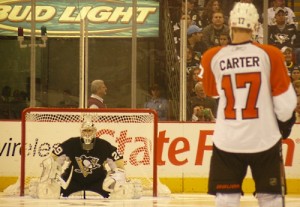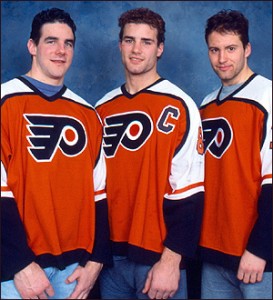After 50 years, the Philadelphia Flyers and Pittsburgh Penguins have developed one of the greatest rivalries in sports. They’ve played each other 281 times in the regular season. The Flyers have won 153 of those matchups, the Penguins 98, and the teams have tied 30 times. The Flyers also hold a 19-16 edge in postseason games.
As intense as the rivalry is today, it was not always so competitive. For much of its history, one team would peak while the other struggled. The Flyers found success early with Bobby Clarke and Bernie Parent, winning the Stanley Cup in 1973-74 and 1974-75.
The Penguins, meanwhile, struggled to find consistent success until Mario Lemieux burst onto the scene in 1984-85. Jaromir Jagr was drafted in 1990-91, and the Penguins won the Cup that year and the following year. While they were celebrating their second championship, the Flyers had missed the playoffs for the third straight year and would fall short for the next two years as well.
Eric Lindros made his NHL debut with the Flyers in 1992-93, though, and the Flyers began to even out the balance of power. Since Sidney Crosby entered the NHL in 2005-06 and Claude Giroux emerged a few years later, the rivalry has become one of the NHL’s fiercest, in large part because the teams have met in the playoffs three times since then.
After 50 years of bad blood between the two teams, here’s a look at five of the greatest war stories from the Battle of Pennsylvania.
Game 4, 2000 Eastern Conference Semifinals: Pittsburgh Marathon
The Flyers and Penguins have engaged in dozens of grueling matchups over the last half-century, but on May 4, 2000, they would need five overtime periods before Keith Primeau mercifully ended the game. It still stands as the longest in modern NHL history.
The 2000 Eastern Conference Semifinals were just the third postseason meeting between the two teams. The Flyers were the top seed in the East that year, but the Penguins won Games 1 and 2 in Philadelphia. In Pittsburgh, the Flyers won Game 3 in overtime. When the teams met for Game 4, they played 152:01 before the final buzzer sounded—that’s just over two and a half games played in one night.
It ended a few minutes after 2:30 a.m., more than seven hours after it began. All told, Brian Boucher made 57 saves for the Flyers, while Penguins goalie Ron Tugnutt stopped 70. Dan McGillis led the Flyers skaters in ice time with 61:05, and Jagr led his club with 59:08.
‘We’re going down in hockey history,’ said Primeau, who had only seven goals in 78 previous playoff games. ‘I was so into the game, I didn’t know what was going on. I didn’t know what time it was, what period it was or even if anybody was watching.’ (Associated Press, ESPN.com)
The Flyers won the next two games and met the New Jersey Devils in the Eastern Conference Finals. Despite Primeau’s fifth-overtime heroics, the series against Jersey wound up defining the Flyers’ postseason that year. They lost to the Devils despite leading three games to one and Game 7 turned out to be Lindros’s last as a Flyer.
2008 Eastern Conference Finals: Pens Win First Series vs. Flyers
After Crosby debuted for the Penguins in the 2005-06 season, the Flyers-Penguins rivalry quickly intensified. An almost instant animosity developed between him and Flyers fans, and it’s only gotten stronger since then. In Crosby’s third year in the NHL, he led the Penguins to their first playoff series win over the Flyers.

Before the start of the season, Crosby became the youngest captain in NHL history at the time at age 19. Crosby and Evgeni Malkin led the team to the Eastern Conference Finals, where they would both face the Flyers in the postseason for the first time.
The Flyers entered the postseason as the sixth seed. They managed to upset the Capitals in seven games. The Flyers followed that up by eliminating top-seeded Montreal in five games. But by the time they reached the Conference Finals, they had run out of magic. They couldn’t pull off the upset against Pittsburgh, who won in just five games.
The Penguins faced the Detroit Red Wings in the Stanley Cup Finals. Detroit won the hard-fought series in six games, but when the two met in the finals again the next year, Pittsburgh came out on top, winning Game 7 on the road.
1994-95 Scoring Race: Eric Lindros vs. Jaromir Jagr
The 1994-95 season was cut short by a lockout, but the 48 games played were enough to generate plenty of excitement among Flyers and Penguins fans. Jagr was playing without Lemieux, who sat out that year to recover from fatigue caused by cancer treatments and other medical problems over the years. Lindros, meanwhile, benefitted from a midseason trade that brought John LeClair to Philadelphia, creating the Legion of Doom.

It looked like Lindros was going to come out ahead, as he had a three-point lead with two games remaining. But in the Flyers’ second-to-last game, he was hit in the face by a puck and missed the final game. Jagr took advantage and scored four goals and one assist in his last three games, tying Lindros at 70 points. Jagr’s 32 goals to Lindros’s 29 broke the tie.
Jagr won the Art Ross Trophy, but Lindros took home the Hart Memorial Trophy as league MVP. Lindros also won what was then called the Lester B. Pearson Award, now the Ted Lindsay Award, given to the “most outstanding player” as voted by the NHL Players’ Association.
Both Lindros and Jagr played in 12 postseason games that year, and both scored 15 points. Jagr scored 10 goals and Lindros had just four, but he and the Flyers made it to the Eastern Conference Finals, one round further than Jagr and the Penguins.
Mar. 2, 1993: Super Mario Returns From Cancer Treatment
The Flyers-Penguins rivalry also saw one of the greatest comeback stories in sports history. On Jan. 12, 1993, the Penguins announced that Lemieux had been diagnosed with Hodgkin’s lymphoma. He was 27 years old at the time and had been dealing with back injuries for years, but he had already scored more than 400 goals and 1,000 points.
Fans knew that Lemieux was going to be remembered as one of the greatest ever. He cemented that legacy on March 2, the day he finished his radiation treatment and suited up for the Penguins’ game in Philadelphia that night.
Before the game, Flyers fans set their grudges aside and gave Lemieux a standing ovation in recognition of his determination and sacrifice.
That’s never happened before, and it will probably never happen again. It was an incredible, special moment in hockey lore. You just have to know it, that rivalry and what it means to people, but on this particular day I was so moved by the people of Philadelphia, seriously, by their warmth and the humanity that we can all have. (Mike Lange, Pittsburgh Penguins play-by-play announcer, NHL.com)
Though Pittsburgh lost, Lemieux scored a goal and an assist. The Penguins had lost momentum while he was undergoing treatment, but his return galvanized the team. They later went on a 17-game winning streak and finished first in the league. And even though Lemieux missed 24 games that year, he scored 69 goals and 160 points in 60 games played. He won another Art Ross Trophy and Lester B. Pearson Trophy. And his incredible comeback earned him the Bill Masterton Memorial Trophy, given to “player who best exemplifies the qualities of perseverance, sportsmanship, and dedication to ice hockey.”
2012 Eastern Conference Quarterfinals: Wild Six-Game Series
The most recent Flyer–Penguins playoff series was like a microcosm of the rivalry itself. The Flyers upset the Penguins in six high-scoring, fight-filled games. Adding to the drama was the fact that when Jagr returned to the NHL earlier that year, he signed with the Flyers instead of returning to Pittsburgh.
Fans were treated to tons of offensive action and even more penalty minutes. The Flyers won in six games, and along the way, the two teams combined for 56 goals and 312 penalty minutes. Game 3 in particular saw a lot of fights, one of which got Craig Adams suspended and coach Dan Bylsma fined. By the end of the game, the referees assessed 158 total penalty minutes.
Though the Flyers’ victory came as a surprise to most, the violence did not. The two teams had played each other near the end of the regular season in a game that spiraled out of control after each team took exception to hits to their star players. In addition to the penalties, the NHL suspended James Neal for charging Claude Giroux.
The series saw some outrageous scores. The Flyers scored eight goals in Game 2 and in Game 3. Both Giroux and rookie Sean Couturier scored hat tricks in Game 2. The Penguins responded by scoring 10 goals in their Game 4 victory. In the final game, Giroux took the opening shift, laid out Crosby, and opened the scoring with his first shot of the game. It was the most entertaining series between the two teams to date and perfectly exemplified just how deep this rivalry runs.